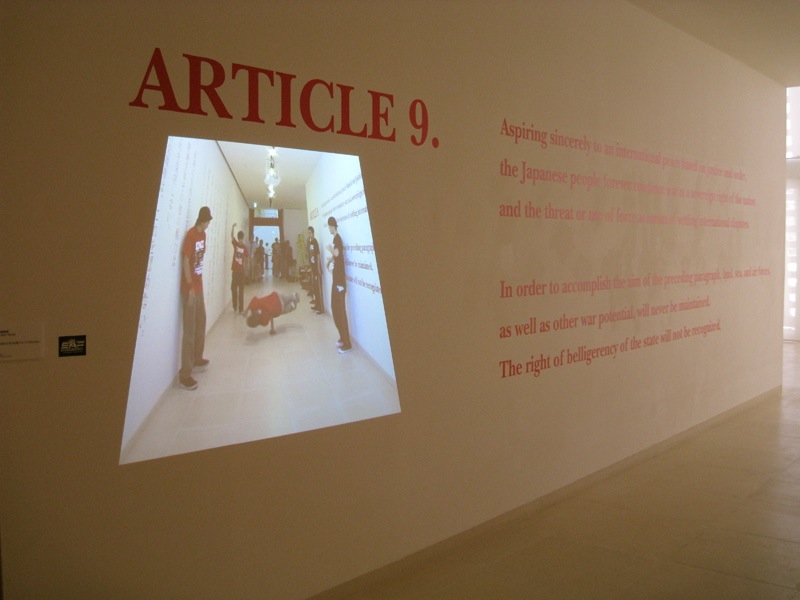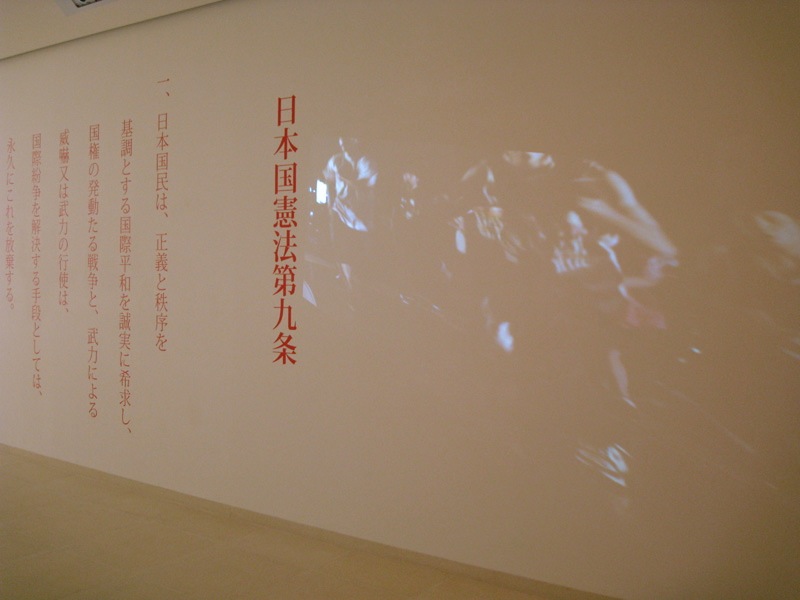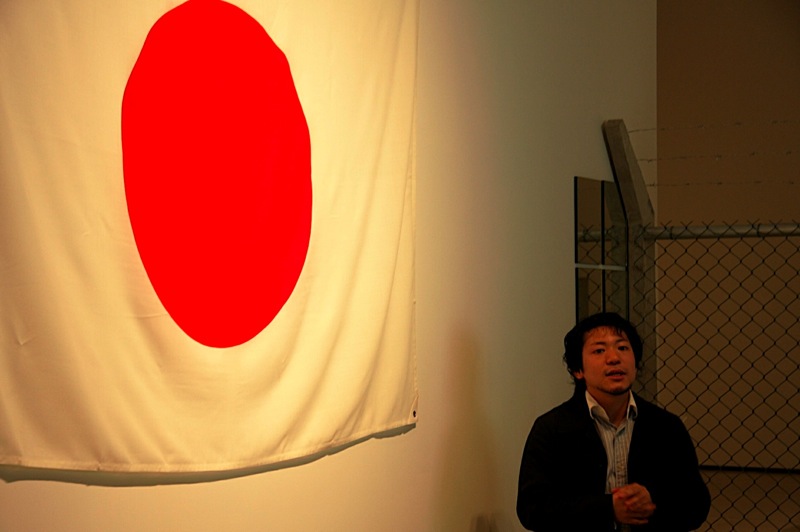October 9, 2014
The Peace Research Institute Oslo (PRIO) presented the director’s short list for the upcoming Nobel Peace Prize, and “Japanese people who conserve Article 9” was listed as the top candidate. Because I curated an exhibition related to Article 9 and postwar Japanese art in New York City, and because I interviewed the last surviving drafter of the Japanese constitution, Beate Sirota Gordon, I would like to share the history and some thoughts about the largely unknown Japanese pacifist constitution, especially “Article 9.”

Yuken Teruya "My Great-Grand Ma, Named USA" 2009
First, we need to know that the Japanese Constitution was secretly drafted by the U.S. occupation forces in Japan in 1946. While maintaining the emperor system due to avoid a possible communist revolution in Japan, Douglas MacArthur, the Supreme Commander for the Allied Powers (generally referred to as GHQ), tried to contain Japanese military so that they would not be able to fight again. As a result, the Japanese Constitution’s Articles 1 to 8, which define the function of the emperor system, and the peace clause – Article 9 – were written as a set. Article 9 reads as follows:
ARTICLE 9.
1. Aspiring sincerely to an international peace based on justice and order, the Japanese people forever renounce war as a sovereign right of the nation and the threat or use of force as means of settling international disputes.
2. To accomplish the aim of the preceding paragraph, land, sea, and air forces, as well as other war potential, will never be maintained. The right of belligerency of the state will not be recognized.
Many of those in GHQ Government Section drafting the new constitution were New Dealers. Witnesses to what had happened in Hiroshima and Nagasaki, they felt that we cannot cause any kind of war in the future. Their ideals were reflected in the Japanese Constitution, which as a result was democratic, liberal, and extremely progressive. The translator of the draft constitution from English to Japanese, 22-year-old Beate Sirota Gordon, also drafted Article 24, which defines citizens’ equal rights and women’s civil rights. When this new Japanese Constitution was enacted in 1947, Article 9 was the most enthusiastically welcomed by the Japanese.


Yuken Teruya "When It Get Birth, It Need to Be Raised" 2009
After instituting Japan’s constitution, GHQ proceeded in a democratization of Japan, and also purged Japanese ultra-nationalists and war criminals. However, because of the intensifying Cold War and the outbreak of the Korean War, American policy started to change, not confining itself to curbing Japan’s militarism, but rather using it to fight against communists, taking what is known as the “reverse-course.” From this point onwards, the U.S. started to use Japan’s former ultranationalist war criminals to defend the capitalist bloc.
When Japan’s Socialist Party united and became the largest party in 1955, Japan’s Liberal and Democratic parties were united with the financial support of the CIA; this was the birth of the Liberal Democratic Party (LDP) of Japan, whose dominance continued until 1993. Since then, the LDP has tried to alter Article 9 in order to rearm, which has been the common aim of America’s Japan handlers and Japanese ultranationalists. The Socialist Party has tried to protect Article 9.
In 1957, Nobusuke Kishi of the LDP, a former class-A war criminal who had worked for the Japanese puppet state Manchukuo, became the prime minister of Japan, and in 1960, he extended the Japan-U.S. Security Treaty. Kishi’s grandson is Shinzo Abe of the LDP, currently the prime minister of Japan, who has ignored Article 9 to rearm, under the slogan “Take Japan Back.”
Since 1955, the LDP tried to alter the Japanese Constitution, focusing mainly on Article 9. But there was a strong movement to defend the Constitution, and especially Article 9, in the name of democracy. Therefore, the Japanese Constitution has not been altered at all since its enactment in 1947.
I think that through these movements of defending Article 9, the constitution became truly legitimate for Japanese people. Without this protest, the Japanese military may have entered many wars alongside the United States. However, maintaining Article 9 has ensured that Japan’s Self Defense Force, created in the process of “reverse course,” has never killed nor lost a single person in combat up through the present.
What I want to point out is that the U.S. policy of “reverse course” created the Abe cabinet which violated Article 9, almost like a Frankenstein’s monster born from the nightmare of Manchuria, and it has created greater instability between Japan and countries surrounding it.


Yuken Teruya “Dawn – Aria” 2009
The prize to be given to the Japanese people makes sense, but we should not forget the ideals of American New Dealers, whose families had suffered during the war, including some who were victims of the Holocaust in Europe. Born in Austria to Jewish parents, Beate Sirota Gordon said that Article 9 was an enormous success for Japan, and that all the world’s constitutions should be altered to contain something analogous to Article 9.
Article 9 questions whether we can love others as much as we love ourselves, and also demands that we realize that the world exists not according to the terms of my own existence, but I became able to exist in this world in relationship with others. Cartesian modernity fixed the existence of the self, and, by extension, the imaginary existence of the nation is defined by its constitution as nation-state. However, if we could realize that all existence is made possible because of the continuity of the self with others, as one finds in the dependent origination of Buddhism, the idea of defining the nation as a way to secure one’s life via a constitution, which in the end creates hypothetical enemies outside of it to fear, will be obsolete.

Shinya Watanabe explains Yuken Teruya’s work "Upside Down Hinomaru" 2006
Especially after seeing the crisis of the nation-state as expressed in separatist movements in Scotland, Catalonia, Taiwan, and Hong Kong, we seriously need to think about alternatives to the nation-state, which is responsible for security and is also the means of causing war.
By protecting Article 9, the Japanese people forever renounce war as a sovereign right of the nation, and have already overcome the limitations of the modern existence of the nation, which defines the enemy outside of it. I hope that if the Japanese people win the Nobel Peace Prize, it will not only stop hawkish Abe cabinet, but also will be a great opportunity for the people all over the world to think about these fundamental issues of modern times.
You can read the long interview with Beate Sirota Gordon on Article 9:
http://www.shinyawatanabe.net/atomicsunshine/BeateSirotaGordon/en/
You can see more Atomic Sunshine in Okinawa exhibition photos:
http://www.shinyawatanabe.net/atomicsunshine/okinawa/photoen.html
Special Thanks to: Yuken Teruya
www.yukenteruyastudio.com






